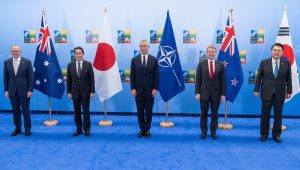For the second year in a row, the NATO summit had some special guests: the leaders of the Indo-Pacific 4 (IP4). Australian Prime Minister Anthony Albanese, Japanese Prime Minister Kishida Fumio, New Zealand Prime Minister Chris Hipkins, and South Korean President Yoon Suk-yeol all attended the summit, held on July 11-12 in Vilnius, Lithuania.
The summit included repeated refrains of what has become a new manta explaining NATO’s strengthened ties in Asia: “What happens in the Indo-Pacific, matters for Europe, for NATO. And what happens in Europe, matters for the Indo-Pacific.”
That philosophy serves to tie together the two main issues under discussion at the summit: Russia’s invasion of Ukraine, and China.
The war in Europe was naturally the major topic of conversation, but the Vilnius Summit Communique also contained a greatly expanded focus on China. As the communique’s top-line summary put it: “The People’s Republic of China’s (PRC) stated ambitions and coercive policies challenge our interests, security and values. We remain open to constructive engagement with the PRC, including to build reciprocal transparency, with a view to safeguarding the Alliance’s security interests.”
In more expanded points later in the lengthy statement, NATO leaders called out China for “malicious hybrid and cyber operations and its confrontational rhetoric and disinformation” and accused Beijing of striving “to subvert the rules-based international order, including in the space, cyber and maritime domains.” The statement also expressed concern over China’s attempts to “ to control key technological and industrial sectors, critical infrastructure, and strategic materials and supply chains” and “create strategic dependencies.”
By contrast, the 2022 Madrid Summit Communique mentioned China only once, as one of several countries “who challenge our interests, security, and values and seek to undermine the rules-based international order.” The Vilnius Summit Communique included 14 mentions of the People’s Republic of China (PRC), indicating a new emphasis on “address[ing] the systemic challenges posed by the PRC to Euro-Atlantic security.”
In a nod to potential divisions within NATO on how to approach China, the statement took care to emphasize that “We remain open to constructive engagement with the PRC, including to build reciprocal transparency.” In particular, some European partners are less keen on embracing the United States’ view of China as a competitor, preferring to keep avenues for cooperation open. But the statement also pledged vigilance “against the PRC’s coercive tactics and efforts to divide the Alliance.”
China did not seem mollified by NATO’s nod to cooperation. A spokesperson for the Chinese Mission to the EU said the communique “is filled with repetitive rhetoric echoing the Cold War mentality and ideological bias.”
“We firmly oppose NATO’s eastward movement into the Asia-Pacific region and any action that jeopardizes China’s legitimate rights and interests will be met with a resolute response,” the spokesperson concluded.
While NATO’s engagement with Indo-Pacific partners is generally read through the lens of competition with China, it’s worth noting that the IP4 have differing comfort levels with the idea of confronting China. NATO Secretary General Jens Stoltenberg held separate meetings with the leaders of Australia, Japan, New Zealand, and South Korea. In each meeting, he began by thanking them for their assistance to Ukraine – NATO’s top priority – and then offered support for the partner’s main issues of concern.
Notably, only in the meeting with Japan’s prime minister did Stoltenberg call out Beijing – specifically, “China’s heavy military build-up, the modernization and expansion of its nuclear forces.” He avoided mentioning China in public remarks with the other IP4 leaders, instead reaffirming NATO’s concern about North Korea (in the meeting with Japan’s Kishida and South Korea’s Yoon), “cyber, new technologies, and also on countering hybrid threats” (Australia), and “climate change, cyber and new technologies” (New Zealand).
All the IP4 members have concerns about China, but three of them prefer not to go on the record joining hands with NATO against Beijing. Japan stands out for its willingness to directly express concerns about Beijing. That may why, as Stoltenberg told Kishida during their meeting, “No other partner is closer to NATO than Japan.”
Earlier this year, following Stoltenberg’s visit to Japan, there were reports that the body would seek to open a liaison office in Japan. That seems to have been postponed, however, with France in particular expressing concerns about antagonizing China.

































